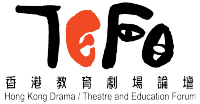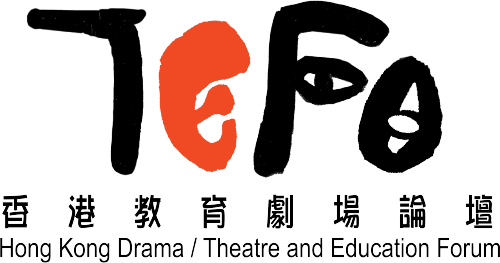Archiving and reporting on the arts is just as important as the execution of artistic practice by itself.
The archival and recording of theatrical work may not be a part of creating the actual work, but it makes sure that theatrical happenings live beyond their ephemerality.
Careful recording and detailed reflections are extensions of the creative process behind any performance, educational program or workshop, and can become valuable learning resources for the entire field.
At TEFO, we’ve always been thinking about how to fulfill our responsibility to develop ourselves as a networking and consulting organization for other practitioners in this field, and we hope that the principle of “Shared Knowledge” can continue carrying us forward in this work.
Thus, we are continually working to strengthen our online database’s ability to gather, organize and preserve applied theatre practice here in Hong Kong, so that our field’s research, records and archives can inspire present and future generations of applied theatre practitioners.
Please note that our English database is still under construction, and there may not be as much content as our Chinese database. For more resources, please visit the Chinese version of our website.
A Multi-case Study of Chinese Language Classrooms with Drama as Pedagogy: A Dialogic Perspective
This multiple ethnographic case studies aims to investigate the critical literacy which emerged and emanated in the Chinese classrooms using drama as pedagogy. Drawing on the perspectives of Critical theories, Bakhtin Mikhail’s dialogism, and also the literatures on critical literacy, this study argues that there is disparity of statuses of languages, knowledges, cultures and peoples within the Chinese language classrooms.
The Development of Drama Education in the Early Childhood Program in Malaysia: Embarked from the Life History of three Malaysian Chinese Drama Teachers (Chinese)|DaTEAsia Vol. 9
Drama education from the West has been developed in Taiwan and Hong Kong for many years. It has been introduced into Malaysian schools through Taiwan by Malaysian Chinese for 20 years. The study in the paper analyzes the drama-learning processes of three Malaysian Chinese kindergarten drama teachers. In examining the individual personal histories, the paper aims to review the development of drama education in early childhood education in Malaysia. Through interviews and the analysis of teaching plans and classroom observations, the research finds that three teachers’ early encounters with drama were somewhat related to the Chinese culture or school drama events. With their own personal interests, followed by informal or formal training and the need of their professional development, these three teachers have developed their own teaching styles. All of the three played crucial roles in the advancement of drama education in Malaysia. With the initiative of the new national ECE (Early Childhood Education) curriculum, there are needs to combine resources from different sectors, to promote dialogues among drama teachers or artists, or to make reference to curriculum models in ECE teacher-training programs in other Asian countries. These are necessary effects for solving problems encountered in the kindergartens and teacher training institutions.
From Drama Improvisation Experiences to the Discussion of Aesthetic Environments for Young Children in Hong Kong | DaTEAsia Vol. 7
Aesthetic development is one of the four primary goals in early childhood development in Hong Kong pre-school education. Its function is to stimulate children’s creativity and imagination. Yet, research in young children’s aesthetic environments in Hong Kong is few and far between. The author’s recent study indicates that young children acquire aesthetic experiences through the practice of “decisiveness, introspectiveness and empathy”. This paper takes the research findings further to examine the impact of aesthetic environments on children’s aesthetic development. Informed by theories in aesthetics, improvisational drama and education, the paper proposes that both the physical and metaphysical environments are crucial to facilitating children’s aesthetic experiences. In the metaphysical environment, teachers’ pedagogical perspectives and practices are the basic factors, and the paper further discusses the role of teacher, the pedagogical approach and orientation in it.
Enhancing School-aged Children’s Social Competence through Educational Drama | DaTEAsia Vol. 6
In this paper, the role of educational drama was examined as a means of promoting primary school students’ social competence. A research study was conducted in 90 public primary school classrooms in Greece. The research data came from 1826 children aged 9 through 11 years (904 boys, 922 girls) in an experimental process of pre-testing and post-testing, using the sociometric nomination procedure of Coie and Dodge (1983). Statistical analysis of research data revealed that: (1) Drama activities have positive effects on students’ social competence and (2) the positive effect that educational drama has on students’ social competence is not related to the age of the children since the research expectations were finally confirmed in all experimental classrooms. Thus, more attention should be paid to a drama-based curriculum in primary school if the development of students’ social competence is to be facilitated.
Story, Play and Enchantment: The Importance of Drama for Children in the Early Years of Education | DaTEAsia Vol. 5
This article is based upon a keynote address I was invited to give at the “International Conference for Drama Education for Young Children” which took place at Nanjing Normal University in June, 2014. In addressing the theme of the conference – Drama, Dream and Children – I chose to refer to two practical examples. My intention was to provoke some thinking about specific ways that drama can contribute to children’s social, moral and language learning, not in any exhaustive way but by drawing attention to some important considerations. In particular I wished to focus on the kind of drama work young children enjoy and are capable of and the crucial role of pedagogy in enabling this to happen.
“Teaching” Children to Play Theatre Games: A Collaborative Inquiry with a Student Teacher | DaTEAsia Vol. 4
In Hong Kong, early childhood educators have progressively emphasized the importance of play. However, it happens that play has long been seen not to be taught explicitly, or other it just to be taught to fulfill academic goals. Moreover, the promotion of play is also further hindered by socio-cultural factors and other general constraints in town. The authors, the teaching practicum supervisor (A1) and her student teacher (A2), believe that education reform should begin with teachers’ self-improvement, reflection and exploration of their classroom teaching practice. This paper has reported their collaborative inquiry on teaching strategies for children to play theatre games. The authors have borrowed the theories of movement instruction to tackle the children’s discipline problems arisen in the theatre games classroom. After reviewing and practicing the revised strategies, the authors, in turn, offer solutions to improve theatre game instruction in a new light by two strategies, namely decomposition of rules of games and the use of structured classroom discourse. As regard the student teacher, this collaborative inquiry has promoted improvement in relation to designing, demonstrating and skills guiding children to play theatre games, and other relevant teaching theories. At the same time, the author (A1) has been placed at a better position to comprehend the problems faced by novice and frontline teachers when using theatre games, from which she has further examined the content and methods of her teacher training.





